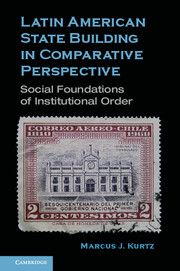Book contents
- Frontmatter
- Contents
- Acknowledgments
- 1 The Difficulties of Studying State Building
- 2 The Social Foundations of State Building in the Contemporary Era
- 3 State Formation in Chile and Peru
- 4 State Formation in Argentina and Uruguay
- 5 Divergence Reinforced
- 6 The Social Question and the State
- 7 Conclusions, Implications, and Extensions
- References
- Index
6 - The Social Question and the State
Mass Mobilization, Suffrage, and Institutional Development in Argentina and Uruguay
Published online by Cambridge University Press: 05 February 2013
- Frontmatter
- Contents
- Acknowledgments
- 1 The Difficulties of Studying State Building
- 2 The Social Foundations of State Building in the Contemporary Era
- 3 State Formation in Chile and Peru
- 4 State Formation in Argentina and Uruguay
- 5 Divergence Reinforced
- 6 The Social Question and the State
- 7 Conclusions, Implications, and Extensions
- References
- Index
Summary
We saw in Chapter 4 that the initial Uruguayan and Argentine state-building trajectories both were favorable – each country had initiated belated, but ultimately successful, national unification and institution-building projects. In this chapter, we consider a subsequent divergence in their paths of political development that came about as the process of state building faced the second great hurdle: the challenge of mass political incorporation. Here the two countries parted ways, as in Argentina, two distinct surges in nonelite political participation induced a dynamic that led to a persistent dynamic of cyclical expansion and contraction of state institutions without the institutionalization of state power. By contrast, in Uruguay, the onset of mass political participation was much delayed and channeled through elite-dominated political parties, permitting the construction of penetrating institutions to govern the political economy well in advance of expanded electoral participation. And these institutions themselves created incentives for political parties that made them self-reinforcing and undergirded their long-run stability even in the face of severe subsequent political and economic challenges. Conversely, in Argentina, the fact that expanded state institutions were the consequence rather than the antecedent of mass working-class political mobilization both undermined their society-wide legitimacy and rendered them ineffective as tools of political management. The result was a spiral of populist institutional expansion and antipopulist retrenchment – tied to cycling periods of democratic and authoritarian politics. Periodic efforts to form cross-class and cross-party compromises over the structure of state institutions were unsuccessful. In Uruguay, expanded political participation, mass mobilization, and inward-looking development were all accommodated within governmental and partisan institutional channels, at least until the breakdown of democracy in 1973. And in Uruguay, meaningful mass political participation tended to strengthen and deepen the state, not weaken it. The consequence was the creation of a firm institutional foundation – one whose basic contours were not fundamentally changed or effectively challenged by turnovers of partisan control, the collapse of democratic politics, or severe economic crisis.
- Type
- Chapter
- Information
- Latin American State Building in Comparative PerspectiveSocial Foundations of Institutional Order, pp. 176 - 226Publisher: Cambridge University PressPrint publication year: 2013



